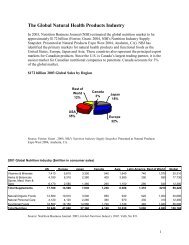Beyond Borders: Global biotechnology report 2010
Beyond Borders: Global biotechnology report 2010
Beyond Borders: Global biotechnology report 2010
You also want an ePaper? Increase the reach of your titles
YUMPU automatically turns print PDFs into web optimized ePapers that Google loves.
“I’m starting to see non-traditional pools of<br />
capital being attracted to this space. They<br />
may come from traditional parties, such as<br />
sovereign wealth and private equity funds,<br />
or potentially from infrastructure funds,<br />
but they are non-traditional in trying to<br />
mitigate some of the technology risk to the<br />
extent possible.”<br />
you resolve disputes during this process? Hence, all these aspects of<br />
governance and valuation are of paramount importance.<br />
Haywood: I also agree that partnerships are absolutely critical. We<br />
have some great partners; our VC investors, Khosla, Flagship and<br />
Lightspeed and now Procter & Gamble and Chevron, have been<br />
very supportive. These technologies take funding and government<br />
help, just as in the field I worked in for 30 years, oil and gas, where<br />
we got a lot of help from the government — depletion allowances<br />
for risky drilling, etc. The same thing applies here. You are going<br />
to need help from government. Other partners are going to be<br />
corporate partners. But it’s very important to have these partners to<br />
supplement venture capital investors.<br />
In our case, Procter & Gamble is a collaborative partner. It is working<br />
very closely with us, in a partnership, to develop sustainable<br />
chemicals. And that’s really driven by its green agenda. The<br />
company has two reasons for that. One is to reduce carbon from its<br />
feedstock. The other is to smooth out some of the economic bumps<br />
that occur from petroleum prices that you can’t control. If you can<br />
come up with alternative chemicals that are sustainable and cost-<br />
effective, you’re going to stabilize the price of petroleum as well. So<br />
it’s really both an economic and climate change approach.<br />
Forer: What are the adoption accelerators for biofuels? Are they<br />
different in developing markets versus developed ones?<br />
Mace: One thing that comes to mind in responding to this question<br />
is the Brazil example and the way in which ethanol actually became<br />
a mass-market reality in Brazil several decades ago. This happened<br />
to such a point that today, some people joke that the alternative<br />
100 <strong>Beyond</strong> borders <strong>Global</strong> <strong>biotechnology</strong> <strong>report</strong> <strong>2010</strong><br />
fuel in Brazil is gasoline, not ethanol, since recently the ethanol<br />
consumption surpassed gasoline for the first time in the country.<br />
Now my perspective on it is that, first of all, there was absolutely<br />
impeccable and unerring commitment from the Brazilian<br />
government to make it happen in their pro-alcohol program. Also,<br />
I believe that, at the time, it did strike a chord with the psyche, the<br />
collective aspirations of the Brazilian people in terms of how it was<br />
addressing some of the needs and desires of the nation.<br />
I think that’s an interesting example to look at, and maybe to<br />
compare and contrast with what is happening today both in Europe<br />
and in the United States.<br />
As I mentioned earlier, creating demand, creating a market, is key<br />
in the early years — effectively kick-starting an industry by creating<br />
a market. I don’t think, however, that this should be anything more<br />
than an “accelerator.” In other words, I don’t believe that incentives<br />
or mandates or other regulatory mechanisms to create the market,<br />
to accelerate the adoption of biofuels, should be permanent. I<br />
believe they should be temporary, up to the point where biofuels<br />
are “grown up” in a way and compete on their own merit with the<br />
incumbents, with fossil fuels.<br />
Haywood: I think that one of the biggest issues in making renewable<br />
fuels and sustainable chemicals is that you look at the world<br />
situation — this is a very macro approach — but I think a lot of<br />
people understand it. In many foreign countries, they do not have<br />
domestic crude supply, and their economies run on imported fuels.<br />
Hence, energy security is a critical issue for a lot of places around<br />
the world. The other example is sugar cane. If you look around the<br />
world, there are many locations closer to the equator where cane<br />
grows like a weed, and it is a very energy-dense source, much better<br />
than corn, for instance. Sugar cane is not a food and there is a lot<br />
of acreage to grow additional cane. Hence, you can make new fuels<br />
from agricultural products in the next couple of years and remove<br />
dependence on petroleum.<br />
Brazil is a great example; they are no longer at the end of the whip<br />
on petroleum prices and that’s a great stabilizing effect on any<br />
economy. So I think those are great adoption accelerators. I think the<br />
other important aspect is governments — government subsidies are<br />
very important to help enable these new technologies. They don’t<br />
have to be around forever, but I think it’s very important that they<br />
stay in place for the next five, six years to enable these technologies.<br />
Because as they roll out — as any technologies roll out — you have a<br />
higher cost of production. As that production runs more smoothly<br />
and you gain time with the production and scale, the costs go down.<br />
So I think subsidies are another very important adoption accelerator.








